 Petzlover
Petzlover Appenzell Mountain Dog is originated from Switzerland but Cockachon is originated from United States. Appenzell Mountain Dog may grow 17 cm / 7 inches higher than Cockachon. Appenzell Mountain Dog may weigh 23 kg / 51 pounds more than Cockachon. Both Appenzell Mountain Dog and Cockachon has almost same life span. Both Appenzell Mountain Dog and Cockachon has same litter size. Appenzell Mountain Dog requires Moderate Maintenance. But Cockachon requires Low Maintenance
Appenzell Mountain Dog is originated from Switzerland but Cockachon is originated from United States. Appenzell Mountain Dog may grow 17 cm / 7 inches higher than Cockachon. Appenzell Mountain Dog may weigh 23 kg / 51 pounds more than Cockachon. Both Appenzell Mountain Dog and Cockachon has almost same life span. Both Appenzell Mountain Dog and Cockachon has same litter size. Appenzell Mountain Dog requires Moderate Maintenance. But Cockachon requires Low Maintenance
 Hailing from the Appenzell region of Switzerland and known as the Appenzeller Mountain Dog or the Appenzeller Sennenhunde, this athletic breed of dog has a history which is debatable and which has several theories.
Hailing from the Appenzell region of Switzerland and known as the Appenzeller Mountain Dog or the Appenzeller Sennenhunde, this athletic breed of dog has a history which is debatable and which has several theories.
It is believed the dog is descended from Molossus.The Appenzeller Mountain Dog is one of the 4 recognized Swiss Sennenhunds, appearing to have descended from cattle dogs. The first breed club was founded in 1906 by Albert Heim. However, an early reference to the breed's predecessors was made in a book of 1853, where it refers to dogs in the Appenzell region.
In 1898 the Appenzeller Mountain Dog was shown at the first international dog show and was recognized internationally as a separate breed in 1989.
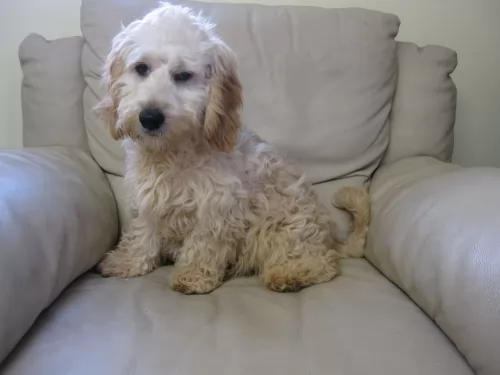 The Cockachon is not a pure bred dog but rather a cross between the Cocker Spaniel and the Bichon Frise. Very little if anything is known about who initially developed the Cockachon. It is known that the International Designer Canine Association (IDCA)registered and recognized the hybrid in 2009.
The Cockachon is not a pure bred dog but rather a cross between the Cocker Spaniel and the Bichon Frise. Very little if anything is known about who initially developed the Cockachon. It is known that the International Designer Canine Association (IDCA)registered and recognized the hybrid in 2009.
It is obviously a relatively new cross breed. The hybrid is also recognized by the American Canine Hybrid Club (ACHC), International Designer Canine Registry (IDCR) and the Designer Dog Kennel Club (DDKC).
 The Appenzell Mountain Dog is a medium-sized dog standing at between 47–58cm at the withers and weighing in at 22–32kg.
The Appenzell Mountain Dog is a medium-sized dog standing at between 47–58cm at the withers and weighing in at 22–32kg.
He is a heavy-built dog and sports a tri-color coat – black, tan and white. He has a double coat with the topcoat being shortish, thick and straight. He sheds throughout the year and isn’t hypoallergenic. He has small ears which are high set and which are floppy. The tail is long and curls when held high.
The Appenzell is an active breed who has been used to herding, fetching and working. Because of his energy levels, he won’t fit in well in a small home where his energy needs can’t be met. However wherever he is, he bonds closely with his human family and thrives on attention from them.
He isn’t known as an aggressive dog, but if as a working breed, he felt that the livestock he was guarding was under threat, he could exhibit some aggressiveness.
He gets on well with children in the home and other pets but is inclined to be wary of strangers. Just as with any other dog, training and socialization does wonders for him, making him relaxed and obedient around people and dogs.
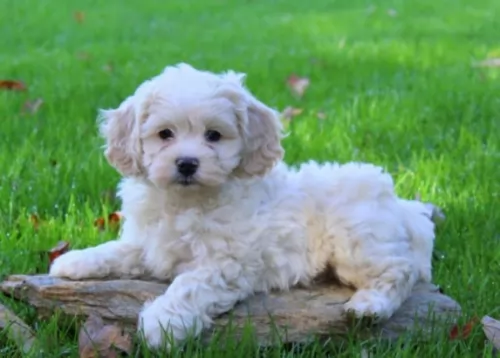 The Cockachon is a cute, little dog very popular in current times. He is small, compact, dark eyes, a round head and black nose. He has a baby face and fluffy hair. It has a furry tail and a blunt muzzle.
The Cockachon is a cute, little dog very popular in current times. He is small, compact, dark eyes, a round head and black nose. He has a baby face and fluffy hair. It has a furry tail and a blunt muzzle.
The Cockachon is a mix between the American Cocker Spaniel and the Bichon Frise. In order to get a better idea of what the hybrid can look like just look at the individual parents. The American Cocker Spaniel is a small dog with a short muzzle and domed head. It is in the Sporting Group, but it is the smallest member of the group. He has a compact, sturdy body and though domed his head is refined.
The Cocker’s stance includes a sloping topline, muscular hindquarters and strong shorter legs adds up to a balanced canine. The coat can be in a wide variety of colors including liver, golden, black, and red. Also, it could be liver and tan, black and tan, roan or tricolors. So, while the Bichon Frise is always white the Cockachon can be any of these colors including white. The types of coats that the Cocker Spaniel and the Bichon Frise have are very different as well.
The Bichon Frise is also a small dog, actually smaller than the American Cocker. The Cockachon usually ends up being about the size of the Bichon at 5-10 kg in weight and 23-30 cm in height. The skull of the Bichon Frise is round rather than domed and the muzzle is also rounded. The tail is long and curly while the Cocker would usually have a cropped tail. The nose and eyes of the Bichon Frise are black and its hair is dense and curly. Unlike the Cocker Spaniel it barely sheds.
Many Cockachon have floppy ears, curly coats and come in any variety of colors though many, many are white.
 Herding dogs tend to be independent and somewhat reserved but the Appenzell Mountain Dog is social, outgoing and loving with his human family. When trained and socialized he gets on well with other pets as well as children in the home.
Herding dogs tend to be independent and somewhat reserved but the Appenzell Mountain Dog is social, outgoing and loving with his human family. When trained and socialized he gets on well with other pets as well as children in the home.
He is a working dog, and thrives on being active, so a good amount of exercise will be necessary. He is a courageous, affectionate dog and when you give him the right upbringing and treat him as he deserves to be treated, he becomes a splendid pet.
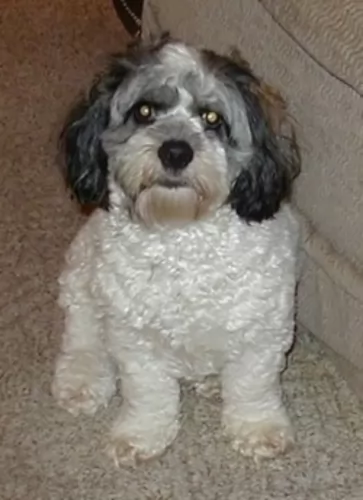 People created the Cockachon to get a small, lap or carry dog that had certain characteristics. These characteristics included a very social, loving dog. He is active and friendly, sweet and gentle. He is loyal, and loves being loved. He is great with other dogs and you can trust him with your children. He is a little independent but very loyal.
People created the Cockachon to get a small, lap or carry dog that had certain characteristics. These characteristics included a very social, loving dog. He is active and friendly, sweet and gentle. He is loyal, and loves being loved. He is great with other dogs and you can trust him with your children. He is a little independent but very loyal.
Like many little dogs he can have serious separation anxiety. Crate training is recommended so that he has a place to feel safe when you are not with him.
 There are some health problems with dogs which are inherited. It is why some people insist on getting certificates from breeders to show that the parents were cleared of certain diseases such as hip and elbow dysplasia.
There are some health problems with dogs which are inherited. It is why some people insist on getting certificates from breeders to show that the parents were cleared of certain diseases such as hip and elbow dysplasia.
Certainly, it’s a known fact that many health problems can be prevented by the way you feed your dog and the way you raise him.
If you suspect your pet is suffering with an ailment that is making him lethargic and run-down, get him to the vet immediately.
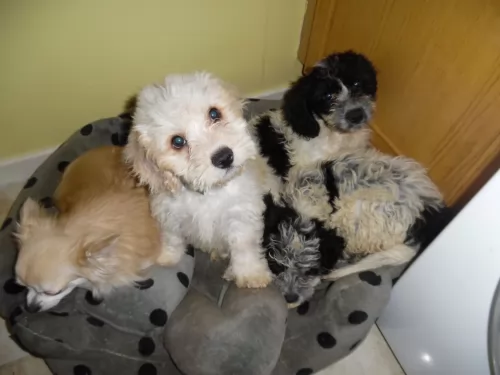 Hybrid dogs seldom have a lot of inherited diseases as they seem to jump a generation but if they do, it can be either a combination of both breeds issues or issues from just one of the breeds in the cross. For the Cockachon these issues include:
Hybrid dogs seldom have a lot of inherited diseases as they seem to jump a generation but if they do, it can be either a combination of both breeds issues or issues from just one of the breeds in the cross. For the Cockachon these issues include:
This loose kneecap issue is common to many small dogs and can cause lameness if not addressed.
Eyelid problems such as the ones that might bother a Cockachon can be found in many small dogs. These include Entropion and Ectropion.
 You want your Appenzell Mountain Dog to maintain his thick shiny coat, and because he sheds throughout the year, a good brushing twice a week will benefit him.
You want your Appenzell Mountain Dog to maintain his thick shiny coat, and because he sheds throughout the year, a good brushing twice a week will benefit him.
Dogs with hanging ears, such as this dog, are always more prone to ear infections, requiring more attention to the inside of the ears. Clean, dry ears resist ear infections.
The Appenzeller is a working dog, used to being active all day, so he will require a lot of exercise. He just loves being outdoors, and while he adapts to city- and country life, he will prefer living in the country. Take him for walks, play ball with him and allow him to run with you when you go jogging or cycling.
A young adult Appenzeller Sennenhunde will require a different calorie intake compared to a dog that has been spayed or neutered or a puppy that is still growing. You need to watch your dog’s age, his size and the particular season of his life he is in and adjust his food intake.
Kibble is good and well, and there are excellent brands packed with nutrients, but your furry friend will require brown rice, vegetables and cooked chicken mixed into his kibble from time to time as well as raw meat added in when possible.
An excellent diet is important for the wellbeing of your pet, and always ensure that fresh, cool water is available.
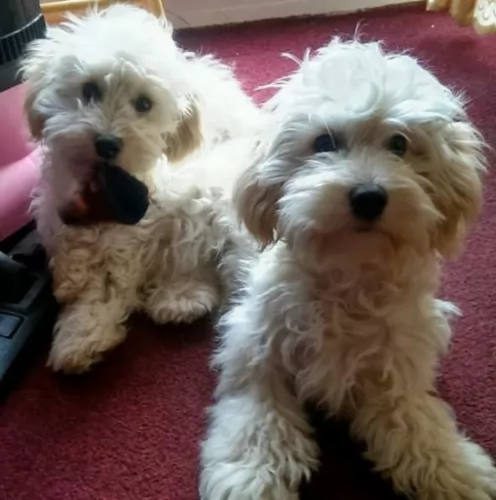 Don’t overfeed a Cockachon. Give him ¾ -1.5 cups of dry food of high quality in two meals per day.
Don’t overfeed a Cockachon. Give him ¾ -1.5 cups of dry food of high quality in two meals per day.
In addition to the issues listed above, the Cockachon is also prone to heart disease and cardiac issues.
The Cockachon has a lot of energy for its size. Make sure it gets plenty of exercise. If walks are the exercise of your choice make sure you walk him for 30 minutes a day. He loves to play, and a back yard would be nice. These little guys do well in obedience but are usually to small for agility.